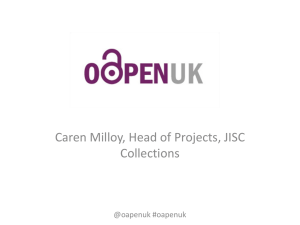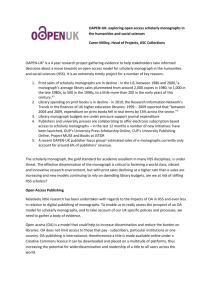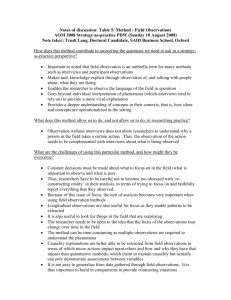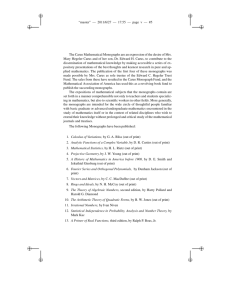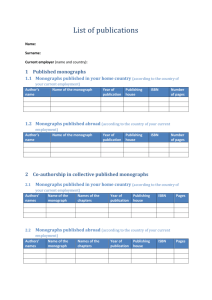Research Plan for Year 3 - oapen-uk
advertisement
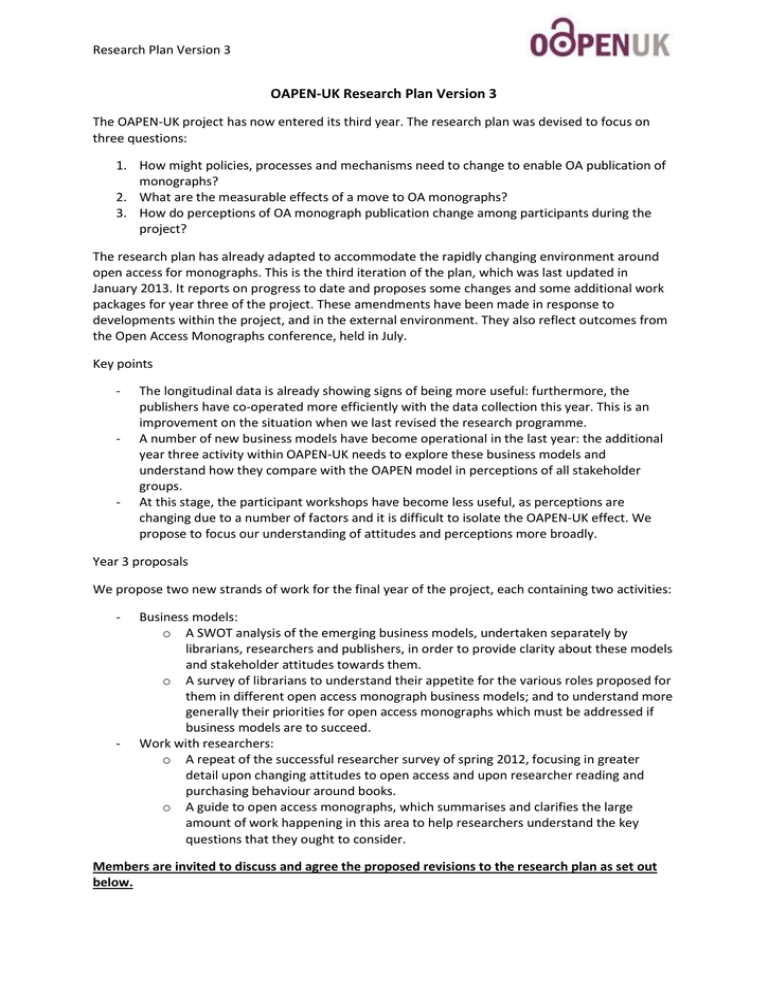
Research Plan Version 3 OAPEN-UK Research Plan Version 3 The OAPEN-UK project has now entered its third year. The research plan was devised to focus on three questions: 1. How might policies, processes and mechanisms need to change to enable OA publication of monographs? 2. What are the measurable effects of a move to OA monographs? 3. How do perceptions of OA monograph publication change among participants during the project? The research plan has already adapted to accommodate the rapidly changing environment around open access for monographs. This is the third iteration of the plan, which was last updated in January 2013. It reports on progress to date and proposes some changes and some additional work packages for year three of the project. These amendments have been made in response to developments within the project, and in the external environment. They also reflect outcomes from the Open Access Monographs conference, held in July. Key points - - - The longitudinal data is already showing signs of being more useful: furthermore, the publishers have co-operated more efficiently with the data collection this year. This is an improvement on the situation when we last revised the research programme. A number of new business models have become operational in the last year: the additional year three activity within OAPEN-UK needs to explore these business models and understand how they compare with the OAPEN model in perceptions of all stakeholder groups. At this stage, the participant workshops have become less useful, as perceptions are changing due to a number of factors and it is difficult to isolate the OAPEN-UK effect. We propose to focus our understanding of attitudes and perceptions more broadly. Year 3 proposals We propose two new strands of work for the final year of the project, each containing two activities: - - Business models: o A SWOT analysis of the emerging business models, undertaken separately by librarians, researchers and publishers, in order to provide clarity about these models and stakeholder attitudes towards them. o A survey of librarians to understand their appetite for the various roles proposed for them in different open access monograph business models; and to understand more generally their priorities for open access monographs which must be addressed if business models are to succeed. Work with researchers: o A repeat of the successful researcher survey of spring 2012, focusing in greater detail upon changing attitudes to open access and upon researcher reading and purchasing behaviour around books. o A guide to open access monographs, which summarises and clarifies the large amount of work happening in this area to help researchers understand the key questions that they ought to consider. Members are invited to discuss and agree the proposed revisions to the research plan as set out below. Research Plan Version 3 Members are invited to discuss and agree the participation of OAPEN-UK in the additional activities outlines below. Research Plan Version 3 1. Quick Reference Summary of Research Plan Version 3 Month Sep Year 1 Sep 11 Aug 12 Benchmarking survey baseline Year 2 Sep 12 - Aug 13 Sales and usage data collection and analysis period Year 3 Sep 13 - Aug 14 Sales and usage data collection and analysis period Learned society case studies begin Analysis of research findings and OA monographs conference feedback to identify key themes for year 3 activity Begin set-up for the SWOT analysis workshops HSS researcher survey. Oct Nov Dec Jan Feb Mar Apr HSS researcher survey May Jun Jul Aug Case studies/indepth interviews with publishers and insitutions focusing on the practical elements such as workflows, policies, systems, processes etc Discussion with Pro VC of research Project's publishers 'this is how we work' documents. Set up and prep for annual participant focus groups Set up and prep for case studies Year 4 Aug 14 - Apr 15 Sales and usage data collection and analysis period Analyse data and prepare final report and recommendations Begin prep for advisory group and interested party focus groups Advisory group focus group; interested party focus group. Final draft report Release report in conjunction with LBF and UKSG Librarian survey. SWOT analysis workshops Funder interviews Monograph guide for HSS authors 2. Research Plan Version 3 The original research plan was broken down into nine work packages, as follows: WP1. WP2. WP3. WP4. WP5. WP6. Literature review Annual benchmarking survey Initial focus groups Initial scoping interviews/survey Quantitative data analysis Annual participant focus groups Research Plan Version 3 WP7. WP8. WP9. Planning for year 3 Additional year 3 activities Final evaluation and report The majority of these work packages will proceed as planned with slight adjustments to the timescale, which are noted in the relevant sections. The more significant changes that we propose affect WP6 and WP7. 2.1 WP4. Initial Scoping interviews / surveys The January 2013 iteration of the research plan outlined our key activities to engage with the various stakeholder groups: namely, learned societies, institutions, publishers and funders. Most of this activity is underway or complete. 2.2.1 Learned societies In June, we decided to undertake case studies of two learned societies with at least one monograph series each. This was in response to a finding from our initial focus group, which suggested that the role of learned societies in the research ecosystem and academic publishing in particular is not fully understood. We have now completed case studies on the Royal Historical Society and the Regional Studies Association, providing a novel perspective on the particular challenges facing learned society presses as they seek to engage with open access, and particularly open access for monographs. In an earlier version of the research plan we had considered undertaking a wider survey of learned societies based on the findings of the case studies. However, we found that the relationships between a learned society’s different roles are very complex and thus best suited to qualitative research, rather than quantitative. 2.2.2 Institutions In version 2 of the research plan, we identified case studies rather than a survey as the best way to explore how open access monographs might affect institutions. This was to ensure that we can understand how the interlocking processes, systems and policies within institutions might respond to open access, and to take account of the many external drivers which are likely to affect an institution’s approach. We have completed case studies with four institutions: Lincoln, York, Sussex and Nottingham, undertaking a total of 27 interviews. The Lincoln case study has been approved and will be published after the steering group meeting on 10 February; the other three are in the process of being completed. Once they are all written up and approved we will produce an overlay document identifying the key points for other institutions to consider when considering how to support or engage with open access monographs. 2.2.3 Publisher interviews In the previous version of the research plan, we proposed to undertake a series of interviews with traditional and new open access publishers to understand their ideas and priorities on open access monographs. This was to understand the likely future development of the market, and to identify any major cross-publisher issue which might need external support if open access monographs are to become more mainstream. Within each publisher, we wanted to speak to people in a number of different roles in order to gain a rounded perspective on everything that a publisher does. Research Plan Version 3 We have carried out interviews with Sage, Palgrave Macmillan, Oxford University Press, Cambridge University Press, Liverpool University Press, Open Book Publishers, Bloomsbury and Manchester University Press. An initial analysis of these interviews will be presented at the steering group meeting, and we will also produce a series of recommendations for institutions, funders, publishers (existing and open access start-ups) and third-party service providers, to help them shape the way they think about supporting and engaging with open access for monographs. We are using some supplementary data from these interviews to support development of the infographic, which is designed to help users visualise the different tasks and processes undertaken by publishers and academics when creating a book. This is to address a clear information need among participants in our initial focus groups, and in particular to ensure any new entrants into the publishing market understand the complexity of the environment they will be working within. 2.2.4 Funder interviews: We believe the funder interviews will still add value. We are planning to speak to the AHRC, ESRC, HEFCE, Leverhulme Trust, the British Academy, an international research funder and the Wellcome Trust. We will commence this work in spring 2014 but believe that some funders e.g. HEFCE may wish to wait until later in the year once they have a more formal position on these issues. Timescale: We propose that the institutional case studies and publisher interviews will be written up by March 14. The funder interviews will be completed and written up by September 14. Products: Infographics, case study reports and interview summaries. 2.3 WP6: Annual participant focus groups These focus groups were designed to test the reaction of project participants to the data. As we agreed not to release the year 1 data, it was not possible to run the first year of participant focus groups. We have seen a dropping-off of engagement, particularly among the participating authors. We believe that persisting with these focus groups would not be a productive use of our time. Instead, we propose to run a single focus group with the full advisory group at the end of the project, to review their experience over the entire course of the project. This will give us an opportunity to analyse their reaction to the full three years of data, and also to review what worked and what did not in relation to the project itself. Both these things will contribute to the final report. We will run a similar focus group with people outside the project but with an interest in this work. Participants might include institutions experimenting with open access, library bodies such as SCONUL or RLUK, research manager organisations such as ARMA and publisher representatives such as ALPSP. The aim will again to be to test reactions to our findings, and to inform the final report. Time allocated to the year 3 participant focus groups will, as last year, be reallocated to other work packages. Timescale: The focus groups will be held in Jan 2015 Products: Final report 2.4. WP7: Planning for Year 3 Based upon the considerable amount of research undertaken within previous work packages and analysis from the post-conference survey, completed by researchers, funders, librarians and publishers, we have identified the following areas as important candidates for further research. We have been mindful of the rapid developments in this area, particularly around business models, and Research Plan Version 3 of the other projects undertaking research into open access for monographs, and monographs more generally. The work we propose is intended to add value to these other activities, and we are running a focus group with key stakeholders at the end of February to ensure that our research plan will meet their needs and not replicate work that they are already planning. Business models There are two distinct pieces of work we propose here: - - SWOT analysis by different stakeholder groups (librarians, researchers, publishers) of the business models being offered for open access publishing. This work would meet a need, identified in the research and the post-conference survey, to provide additional clarity around the various business models, and would ensure that the concerns and priorities of different groups of stakeholders in relation to specific business models are clearly laid out. Librarian survey. Many of the business models rely upon involvement from librarians as, for example, funders, publishers or ongoing purchasers of alternative formats. Yet librarians’ appetite for these roles is not currently understood. The institutional case studies also identified concerns among librarians about long-term availability of open access content, which could affect their willingness to promote OA monographs to users. This survey would help to establish attitudes to open access publishing among librarians in order to further develop business models that will meet their needs. It would also test how significant a priority open access monographs are compared to open access journals. As far as we know, no other project is attempting to look at these issues in an overarching way which does not focus upon a specific business model. Therefore we believe these two pieces of work will plug an important gap in the wider debate, and enhance the work that other organisations are doing. Work with researchers The conference feedback highlighted this as a particularly important theme. Work is needed in two core areas; understanding researcher attitudes towards open access monographs and books more generally, and improving researcher understanding of open access monograph publishing. The institutional case studies revealed some interesting details in the relationship between researchers and books which deserve wider testing. Again, we propose two related pieces of work: - - Researcher survey. The initial researcher survey, conducted in 2012, received a strong response and has been widely used by others investigating this area. This time, we propose to focus upon changing attitudes to open access and a more detailed investigation of researcher reading habits, to inform development of open access models. Guide for monograph authors on open access. The guide to Creative Commons licensing has been well-received and the conference feedback suggests that a similar guide on open access for monographs would have value. As with the CC guide, this will not attempt to sway researchers towards a particular point of view: rather, it will provide an overview of the considerable activity in this area and identify some important questions that researchers should ask when considering open access monographs. We propose that this piece of work should happen towards the end of 2014, to ensure that it can build upon the finished OAPEN-UK project and also the report of the HEFCE group on monographs. The guide’s format would allow individual institutions to customise information to reflect their own policies and priorities. Technology Research Plan Version 3 There is a third theme around technological developments that might be needed in order to support open access for monographs. Third parties such as metadata suppliers, standards agencies and library suppliers need to work with publishers and libraries to ensure seamless workflows around open access monographs. Towards the end of the project, building upon data collected through the various work packages, we will identify three or four priorities around technology and standards which future work in this area will need to engage with. 3. Budget and Risk Register The proposed revisions to the research plan have an impact on the project budget and risk register. The risk register has been updated as in Annex K and the revised budget is presented in Annex J. Both items are on the agenda. Members are invited to discuss and agree the proposed changes to the Research Plan V3, risk register and budget.
